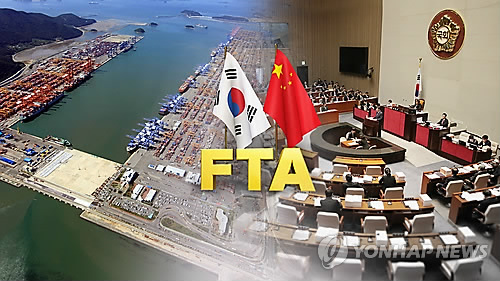One day before South Korea and China are scheduled to hold the first meeting of the free trade agreement joint committee, the trade minister here said Thursday that he is considering discussing about recent trade issues with China over Seoul’s decision to deploy a US Terminal High Altitude Area Defense anti-missile battery.

(Yonhap)
“We will raise the relation between issues raised by Korean companies and the deployment of THAAD during the meeting of the Korea-China FTA joint committee on Friday,” Joo Hyung-hwan, minister of Trade, Industry and Energy, told parliament. “We will take an active response in order to prevent our companies from being treated unfairly.”
Joo said the ministry will consider taking legal actions if there is any violation of international law.
The meeting, held for the first time since the FTA went into effect in December 2015, is set to discuss the current issues on bilateral trade and progress made under the FTA.
The meeting came as the list of China’s official and unofficial trade actions against South Korea’s businesses continues to get longer.
Earlier this week, local media reported that the General Administration of Quality Supervision, Inspection and Quarantine of China released a list of food items and cosmetics banned as imports. Nineteen out of 28 cosmetics included in the list were South Korean cosmetics in November. A total of 11 tons of products were returned due to the ban, fanning fears over China’s economic retaliation over the planned THAAD deployment.
According to South Korea’s state-run Korea Trade-Investment Promotion Agency on Thursday, China expanded its anti-dumping duties imposed on South Korea-made optical fibers by five years starting from Jan. 1.
“We would like to deliver the concerns of Korean companies doing business with China and hear opinions of Chinese counterparts,” a Trade Ministry official said.
The official, however, said that as the issue related to THAAD is not among the official discussion items with China, it remains to be seen how the discussion would pan out.
China has never admitted that it is taking measures against Korean companies as part of retaliation for THAAD and is likely to reiterate that the measures are in line with their regulations and laws.
“Businesses are helpless and want the government to take some kind of action,” a China business expert said on condition of anonymity. “When China tightens up the enforcement of their regulations suddenly and says it is in accordance with their regulations, there is nothing much we can do about it.”
Other trade sanctions include banning K-pop and Korean TV dramas from Chinese television. The Chinese government launched a massive tax investigation and safety inspection on Lotte’s businesses in China. Ion-batteries made by Samsung SDI and LG Chem, South Korea’s leading electric vehicle battery makers, were excluded from the list eligible for government subsidies in China, dampening the companies' business prospects in the world's largest electric vehicle market.
China has strengthened its visa issuance process starting from Jan. 1 and the Chinese aviation authority declined a request for unscheduled charter fights on eight different routes to South Korea in January and February. The airlines applied for flights in December in order to cater to the growing demand during the seven-day of holidays for the Spring Festival, which falls from Jan. 27 to Feb. 2.
Most recently, Chinese authorities sent back 11 tons of cosmetics products citing insufficient documentation.
But based on its own investigation, the South Korean authorities including the Ministry of Food and Drug Safety concluded that the companies did fail to meet the requirement.
“As the volume of cosmetics shipments increase, so have inspections and disqualifications,” an official from the MFDS said. “It is too early to tell if the banning was linked to any political dispute.
By Park Ga-young (
gypark@heraldcorp.com)






![[Graphic News] More Koreans say they plan long-distance trips this year](http://res.heraldm.com/phpwas/restmb_idxmake.php?idx=645&simg=/content/image/2024/04/17/20240417050828_0.gif&u=)